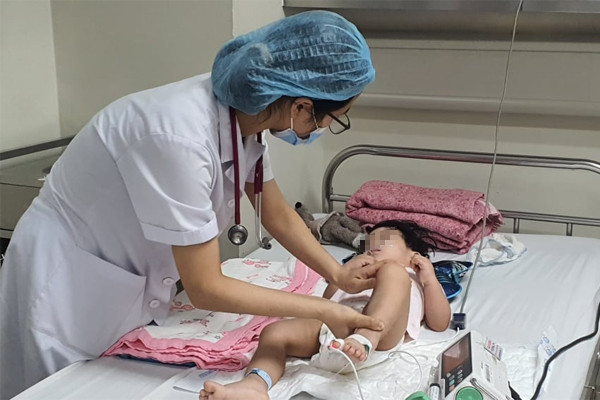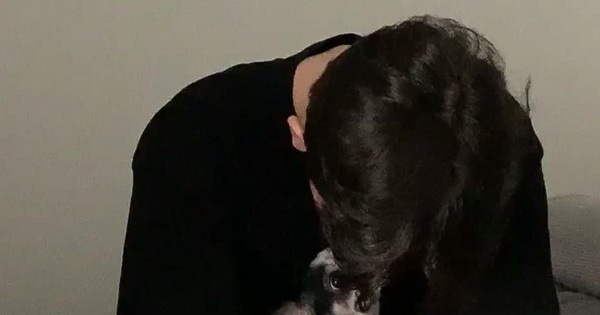Critically ill babies with severe sequelae just after a fever
Lying in bed in room 308, the Intensive Care Unit of the Center for Tropical Diseases (Central Children’s Hospital), a 20-month-old girl from Lao Cai is constantly being massaged by her father and rehabilitated.
At the end of April, the girl had a fever in the middle of the night. About 9 hours later, the baby had a high fever, 39-40 degrees Celsius with signs of convulsions. With a hot compress, taking fever-reducing medicine, the child responded, but by late afternoon, the high fever with convulsions returned.
Seeing something unusual, Mr and Mrs NQK (the baby’s father) took the child to a provincial hospital. Test results, CT scan, EEG, chest X-ray showed that the baby had pneumonia and encephalitis.

Indicated to use sedatives due to high fever, convulsions, constant lethargy. After 3 days of admission, the baby still showed signs of convulsions even though the fever subsided. From May 2, the baby was transferred to the National Children’s Hospital in a state of severe brain damage.
After 3 days of being treated at the Emergency Room of the Intensive Care Unit with a diagnosis of Herpes simplex virus (HSV) encephalitis, from yesterday (May 5), the girl was transferred to a normal room. Mr. K. also said that the baby had never been vaccinated against encephalitis.
Doctors said that due to severe sequelae after encephalitis, severe damage to the temporal lobes on both sides, the baby now has impaired consciousness and increased muscle tone.
HSV encephalitis is an acute neurological infection that causes necrosis with hemorrhage in the brain parenchyma.
The disease manifests with high fever, convulsions, impaired consciousness and coma, with a high risk of death or severe sequelae. However, with early diagnosis (within the first 3 days of symptom onset), specific drug treatment, and intensive care, patients usually have a good prognosis.
The disease usually has a sudden, acute onset with high fever, headache, followed by convulsions, personality changes, memory loss, and coma. Focal neurologic findings suggest temporal and frontal lobe lesions.
The 20-month-old girl above is one of the most severe encephalitis patients received by the Center for Tropical Diseases recently. Currently, there are 28 patients in the Intensive Care Unit, 2/3 of which have encephalitis and meningitis.
Another case of encephalitis being monitored is a girl TA (9 months old) from Lai Chau. The baby was admitted to the hospital in a state of continuous high fever, coma, convulsions, requiring endotracheal intubation. Severe brain damage, the baby’s disease progression was so critical that it seemed impossible to survive.
At the emergency room, the baby was continuously mechanically ventilated, using drugs to prevent cerebral edema, anticonvulsants, and treat increased intracranial pressure. The baby is now more awake but is still on the ventilator.
Dr.BS Bui Huu Nam, Head of the Intensive Care Unit of the Center for Tropical Diseases, said that the baby was diagnosed and monitored for encephalitis, but the cause of metabolic disorders has not been ruled out.
An increase in pediatric cases of encephalitis is expected in the next few weeks
The Ministry of Health said that in the first 4 months of 2022, there were 42 cases of viral encephalitis in the whole country.
According to Dr. Nam, May-August every year is the period when an increase in encephalitis diseases is usually recorded, especially Japanese encephalitis. Therefore, in the next few weeks, the number of hospitalized encephalitis patients is likely to increase further.
Japanese encephalitis is an acute inflammatory disease of the brain tissue caused by the Japanese encephalitis virus. This is the leading virus causing encephalitis in Asia, including Vietnam.
The disease can occur at any age, but is most common in children between the ages of 2 and 8.
This is considered one of the dangerous diseases with high mortality and sequelae in young children (from 25-35%). These sequelae cause patients to reduce their ability to communicate, reduce or lose their ability to work, becoming a burden on the family and society.
In addition to Japanese encephalitis virus, recently, the Intensive Care Unit also recorded a number of children with encephalitis caused by HSV, HHV-6 (human Herpes type 6) or Covid-19…
Dr. Nam said that the children with encephalitis and meningitis treated here in the past time were of different ages, from more than 1 month old to 13-15 years old. Among these, a few days old baby was diagnosed with Japanese encephalitis, came to the hospital in a critical condition, and had to receive respiratory support.
In fact, many children for many reasons can be subjective, do not recognize the early signs of encephalitis, so they arbitrarily buy drugs for treatment, delay in taking their children to the hospital.
Therefore, Dr. Nam recommends parents to pay attention if the child has a high fever continuously, vomits, has symptoms of movement disorders and disturbances of consciousness such as difficulty moving limbs, tremors, lethargy, lethargy, and lethargy. dreams, convulsions, coma…, with older children, children with signs of headache… should be taken to the hospital immediately.
Also according to Dr. Bui Huu Nam, most of the cases of encephalitis who come to this clinic have not been vaccinated or have not had enough booster shots of vaccines against existing encephalitis diseases (such as Japanese encephalitis vaccine). Copy, pneumococcal vaccine, 6-in-1 vaccine…).
The doctor recommends that parents should take their children to get all the vaccines against encephalitis and meningitis.
Besides, the family also needs to pay attention to hygiene and clean eating to help children improve their health; wash children’s hands before eating; clean the house, the children’s living environment is clean and cool…
Thanh Hien
at Blogtuan.info – Source: vietnamnet.vn – Read the original article here


